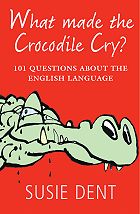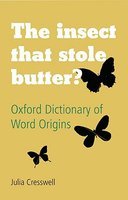- HOME
- ENGLISH FORUM
- BADLY WRITTEN, BADLY SPOKEN
- GETTING
TO KNOW ENGLISH - PREPARING FOR ENGLISH PROFICIENCY TESTS
- POUR OUT YOUR MIND IN ENGLISH
- GOING DEEPER INTO ENGLISH
- YOU ASKED ME THIS QUESTION
- EDUCATION AND TEACHING FORUM
- ADVICE AND DISSENT
- MY MEDIA ENGLISH WATCH
- NOTABLE WORKS BY OUR VERY OWN
- ESSAYS BY JOSE CARILLO
- ABOUT JOSE CARILLO
- READINGS ABOUT LANGUAGE
- TIME OUT FROM ENGLISH GRAMMAR
- NEWS AND COMMENTARY
- BOOKSHOP
- ARCHIVES
READINGS IN LANGUAGE
This new section features links to interesting, instructive, or thought-provoking readings about the English language. The selections could be anywhere from light and humorous to serious and scholarly, and they range widely from the reading, writing, listening, and speaking disciplines to the teaching and learning of English.
Of crocodile tears and the winged thing that stole butter
Some expressions in the English language are just a flash in the pan, so to speak; most flame out for a few moments—a few for perhaps a few weeks or months at best—and slide into disuse and oblivion forever. Others, however, survive the test of time and changing lifestyles, embedding themselves deeply into the language to become its metaphors and idioms.
In an article for the December 21, 2009 issue of the National Post, Robert Fulford makes a quick survey of some of the metaphors and idioms of English that have surmounted its ineluctable process of natural selection—expressions that remain current like “steal one’s thunder,” “crocodile tears,” “straight from the horse’s mouth,” and “by the skin of one’s teeth.”
Along the way, Fulford makes a passing review of two book releases on the English language by the Oxford University Press, lexicographer Susie Dent’s What Made the Crocodile Cry?: 101 Questions about the English Language and a new edition of a book on word origins edited by Julia Cresswell, The Insect that Stole Butter (You guessed right, that insect is the butterfly!)

Fulford says that “a democratic if unconscious process governs the development of language. It operates like a version of Darwinism, the origin of words by means of natural selection. All users of English get a vote. A word appears, gets tried and wins tenure only if speakers find they need it. Accepting the words we find useful, we thoughtlessly (like nature itself) cast aside those that we don't require.”
Read Robert Fulford’s “Thunder and enlightening” in the National Post now!
In What Made The Crocodile Cry?: 101 questions about the English language, Susie Dent draws on her popular TV program on English to share insights about the origins and spelling of its words and their grammar and evolving usage. She answers intriguing questions like the following: “Which ending came first: ‘-ise’ or ‘-ize’?” “Where does the idea of a ‘white elephant’ come from?” “Who decides on the collective noun for something?” And, as asked in the title of the book, “What is it that made the crocodile cry?”
Read David Wilton’s review of What Made the Crocodile Cry? Now!

In The Insect That Stole Butter: Oxford Dictionary of Word Origins, Julia Cresswell traces the origins and development of over 3,000 English words and phrases. It tells fascinating stories behind many odd English terms and expressions like “butterfly,” which had its beginnings when Geoffrey Chaucer (c. 1343–1400), the famous English author who wrote The Canterbury Tales, first used the word “boterflye” in one of his stories, “The Nun’s Priest’s Tale.”
Read a fuller description of The Insect That Stole Butter by its publisher now!
View the complete list of postings in this section
(requires registration to view & post)






